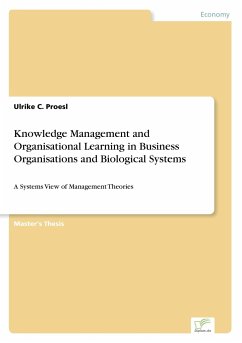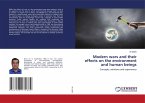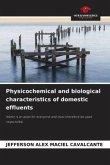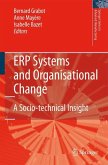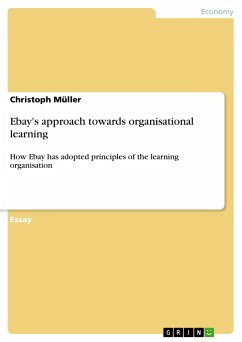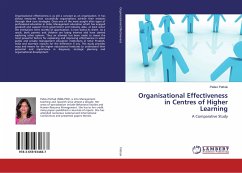Master's Thesis from the year 2000 in the subject Business economics - Business Management, Corporate Governance, grade: 1,0, Munich Business School University of Applied Sciences (Unbekannt), language: English, abstract: Inhaltsangabe:Abstract:
Writers on management and organisational excellence today provide a set of prescriptions, which they argue will lead to healthy, well functioning firms. Within the management sciences there has been a growing tendency to view organisations as complex systems, that is, to describe them as organisms. Increasingly the hard sciences are being used to describe and analyse organisations.
In the field of creative problem solving several systems authors have advocated the use of metaphors to describe certain aspects of organisations. In reviewing much of today s management literature we are exhorted to use benchmarks, for a variety of management tasks. In reviewing organisational excellence we are duty bound to find a measure that will be relevant tomorrow as well as today.
Conjoining these current themes in management, this thesis seeks to review what we know about the effective collective functioning of selected species and to compare these natural systems with organisational systems. We posit the question: Can an understanding of the functioning of natural systems help us to understand how organisations function? If so, what can we learn about the effective functioning of organisations.
Firstly we will review common management theories, with a focus on organisational learning and knowledge management.
Secondly we will look at three natural organisations: Honey bees, leaf-cutter ants and the African locust. We want to find out how these organisations function, and specifically search for knowledge management and organisational learning within these biological systems.
Then we will try to link management theories with our findings in natural organisations.
This approach will finally deliver some interesting hypothesis about knowledge management and organisational learning - both valid for human and natural organisations.
Inhaltsverzeichnis:Table of Contents:
Table of Contents2
Acknowledgements4
Technical remarks4
Preface5
Introduction5
I.Management Theories on Organisational Learning and Knowledge Management7
1.1A Company's Driving Forces: The Seven-S-Model (McKinsey & Company, Inc.)7
1.2The Structure of Organisations (Henry Mintzberg)8
1.3The 5th Discipline - Innovating the Learning Organisation(Peter M. Senge)9
1.4The Peak Performance Organisation (PPO)- what Management can learn from Sports Organisations(University of Waikato, New Zealand)12
1.5Workgroups and Virtual Organisations: Fashion or Future?14
1.6The 21st century: Collaborating to Compete? 14
1.7Drivers for Excellence16
1.7.1Leadership16
1.7.2.1Knowledge Management18
1.7.2.2Information Technology as supporting tool for Knowledge Management and Organisational Learning18
1.9Summary and Key Findings19
II.Organisational Learning and Knowledge Management within Natural Systems20
2.1Organisational Excellence - Biological Networks (Santa Fe Institute of Technology)20
2.2Natural Systems20
2.2.1Honey Bees21
2.2.2Leaf-cutter ants26
2.2.3The African Locust29
2.3Organisational Excellence and Knowledge Management within Natural Organisations: Summary and Key Findings30
III.Management Literature linked with Natural Systems34
3.1McKinsey's 7-S-Model within Natural Organisations34
3.2Mintzberg: Situational factors as determinants of organisational structure and strategy35
3.3The 5th Discipline -Ants, Bees and Locust Populations as Learning Organisations36
3.4Leaf-cutter Ants - a Peak Performance Organisation?38
IV.Conclusions39
4.1What is Knowledge?39
4.2Prerequisites for Learni...
Hinweis: Dieser Artikel kann nur an eine deutsche Lieferadresse ausgeliefert werden.
Writers on management and organisational excellence today provide a set of prescriptions, which they argue will lead to healthy, well functioning firms. Within the management sciences there has been a growing tendency to view organisations as complex systems, that is, to describe them as organisms. Increasingly the hard sciences are being used to describe and analyse organisations.
In the field of creative problem solving several systems authors have advocated the use of metaphors to describe certain aspects of organisations. In reviewing much of today s management literature we are exhorted to use benchmarks, for a variety of management tasks. In reviewing organisational excellence we are duty bound to find a measure that will be relevant tomorrow as well as today.
Conjoining these current themes in management, this thesis seeks to review what we know about the effective collective functioning of selected species and to compare these natural systems with organisational systems. We posit the question: Can an understanding of the functioning of natural systems help us to understand how organisations function? If so, what can we learn about the effective functioning of organisations.
Firstly we will review common management theories, with a focus on organisational learning and knowledge management.
Secondly we will look at three natural organisations: Honey bees, leaf-cutter ants and the African locust. We want to find out how these organisations function, and specifically search for knowledge management and organisational learning within these biological systems.
Then we will try to link management theories with our findings in natural organisations.
This approach will finally deliver some interesting hypothesis about knowledge management and organisational learning - both valid for human and natural organisations.
Inhaltsverzeichnis:Table of Contents:
Table of Contents2
Acknowledgements4
Technical remarks4
Preface5
Introduction5
I.Management Theories on Organisational Learning and Knowledge Management7
1.1A Company's Driving Forces: The Seven-S-Model (McKinsey & Company, Inc.)7
1.2The Structure of Organisations (Henry Mintzberg)8
1.3The 5th Discipline - Innovating the Learning Organisation(Peter M. Senge)9
1.4The Peak Performance Organisation (PPO)- what Management can learn from Sports Organisations(University of Waikato, New Zealand)12
1.5Workgroups and Virtual Organisations: Fashion or Future?14
1.6The 21st century: Collaborating to Compete? 14
1.7Drivers for Excellence16
1.7.1Leadership16
1.7.2.1Knowledge Management18
1.7.2.2Information Technology as supporting tool for Knowledge Management and Organisational Learning18
1.9Summary and Key Findings19
II.Organisational Learning and Knowledge Management within Natural Systems20
2.1Organisational Excellence - Biological Networks (Santa Fe Institute of Technology)20
2.2Natural Systems20
2.2.1Honey Bees21
2.2.2Leaf-cutter ants26
2.2.3The African Locust29
2.3Organisational Excellence and Knowledge Management within Natural Organisations: Summary and Key Findings30
III.Management Literature linked with Natural Systems34
3.1McKinsey's 7-S-Model within Natural Organisations34
3.2Mintzberg: Situational factors as determinants of organisational structure and strategy35
3.3The 5th Discipline -Ants, Bees and Locust Populations as Learning Organisations36
3.4Leaf-cutter Ants - a Peak Performance Organisation?38
IV.Conclusions39
4.1What is Knowledge?39
4.2Prerequisites for Learni...
Hinweis: Dieser Artikel kann nur an eine deutsche Lieferadresse ausgeliefert werden.

